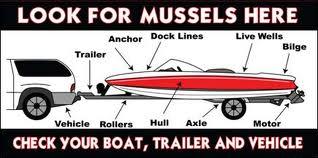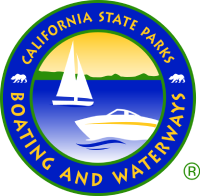Boating / Kayaking / Sailing and Quagga Inspections have resumed at Contra Loma and Shadow Cliffs.
- Fees
- Mandatory Watercraft Inspections
- Visual Inspections and Tips for Passing
- If You Do Not Pass Inspection
- Banding and Re-entry Program
- Wet Weather Protocol
- Quagga Grant Program
Invasive Dreissenid Mussels, commonly known as quagga and zebra mussels, first became a concern to California in 2007. In early 2008, zebra mussels were discovered for the first time in Northern California at Lake San Justo in San Benito County. Mussels can quickly contaminate the waterways and can rapidly spread via watercraft, trailer, or equipment from infected waters. The California Department of Fish and Wildlife is the lead agency on these invasive mussels and their status within the State.
Online resources
State of California - Invasive Species Program: Clean, Drain and Dry All Watercrafts
For more information, or call their hotline at 1-866-440-9530.
Download: FAQ from CA Department of Fish & Wildlife
Quagga Control (A Dance Party), 3m:13s
Fees
Non-refundable inspection fees:
- $7 for motorized vessels; can be waived for future visits after initial inspection with use of banding program;
- $4 for car-top or inflatable. Kayak/car-top inspection fee is good for 30 days from date on the receipt but must be inspected every time.
Mandatory Watercraft Inspections

Watercraft that are required to undergo inspections include boats, kayaks, canoes, sailboats, inflatable craft, and any form of floating board. Inspections are required at the following locations:
- Contra Loma Regional Park
- Del Valle Regional Park
- Lake Chabot Regional Park
- Quarry Lakes Regional Recreation Area
- Shadow Cliffs Regional Recreation Area
Inspections prevent the introduction of invasive mussels into local lakes and reservoirs. The inspection includes a vessel history survey and a hands-on visual inspection. The vessel history survey identifies any watercraft that has been in an invasive mussel-infested water body within the last 30 days, including Lake Mead, Lake Havasu, Lake Mojave, Lake Skinner, Copper Basin Reservoir, San Justo Reservoir, water bodies in San Benito County, in California counties south of the Tehachapi Mountains, and any waters outside of California. Note that this list is growing as we learn more. A thorough hands-on visual inspection by trained staff ensures that a watercraft is clean and dry. Wet watercraft with wet motors gears or equipment will be denied launching. All campers with watercraft must go to the boat inspection prior to checking into the campground.
Current registration is required for all motorized craft.
Visual Inspection and Tips for Passing
To pass inspection, all watercraft and accessories must ABSOLUTELY be clean and dry. This includes motor (plus outboard motor cooling system), deck, hull, bilge and bait wells (No live bait with the exception of worms and nightcrawlers is permitted), ropes, lines, floats, fishing equipment, trailer, rear of vehicle, personal flotation devices, and any other inflatable watercraft. Watercraft that fail inspection will not be permitted to launch and must wait five days before returning.
Tips for Passing Watercraft Inspection
Boats
Do all maintenance and cleaning a few days prior to your trip to the lake. If you have recently flushed your motor, leave it down to allow the water to drain from the intakes.
On the day of your trip, check for water in all compartments. This includes checking the bilge, live wells, engine compartment, and dry storage areas. Tilt the motor up and down multiple times to ensure that all the water has drained out. A vacuum or mop may be useful in drying out hard-to-reach areas.
- Check all ropes, life jackets, paddles, and seats to ensure they are dry.
- After each use, pull the drain plug and allow all the water to drain out.
- Keep all ice chests in your vehicle until you have passed the watercraft inspection point to guarantee that ice water does not spill into the watercraft.
Kayaks
- Clean and dry your kayak after every use.
- Store absorbent blocks outside the kayak to allow them to fully dry.
- Store kayaks with the drain plug out.
- On the day of your trip, check all compartments, life jackets, and paddles to ensure that they are dry. Dry out any water found.
Inflatables
- Wash and dry your inflatable craft after every use.
- Check that the inflatable craft is completely dry before placing it in a storage bag.
Common Reasons for Failing Watercraft Inspection
Several watercraft fail inspection each day and unfortunately are not allowed to launch.
The most common reason for failure is water in the outboard motor. DO NOT FLUSH YOUR MOTOR PRIOR TO VISITING THE PARK. Staff recommends allowing at least a five-day waiting period after flushing your motor to give it plenty of time to dry. Double check before leaving home that the motor is dry, many people are surprised that, when asked to lower their motor, water comes out. By contract, inspectors cannot pass these watercraft to launch. Water in live wells accounts for the second most-common reason for not passing inspection.
If You Do Not Pass Inspection
- Your watercraft launch fee will be refunded, and your entry fee will be refunded if you exit the park.
- Trailered vessels not passing inspection will be subject to a five-day quarantine period. For example, not passing on the 1st of the month will require waiting until the 7th for reinspection.
- Trailered vessels not passing must pay another inspection fee when being reinspected.
- Kayak/car-tops not passing inspection will be subject to the quarantine period.
- Your watercraft inspection fee will not be refunded.
Banding and Re-entry Program
To make re-entry easy, the Park District offers a banding program to place a secure, tamper-proof plastic tie between the watercraft's bow-mounted eye bolt and the trailer when watercraft leaves the lake.
- Watercraft returning to an EBRPD lake or reservoir with an intact band will receive an abbreviated inspection, and will not be subject to another inspection fee. Entrance and launching fees still apply.
- Watercraft may be re-banded repeatedly, as long as the watercraft arrives at the lake with an intact band, the operator has in his or her possession a copy of their inspection form and receives a new band immediately after coming off the lake.
- EBRPD will honor the EBMUD quagga program banded watercraft at all EBRPD facilities. EBMUD banded watercraft will not be subject to an inspection fee. However, all other park use and watercraft launch fees will still apply.
Car-top watercraft such as kayaks and canoes are inspected each time they enter a lake, but the inspection fee is only charged once every 30 days. The owner must provide a copy of the initial inspection form, with the receipt dated within the previous 30-day period. The survey and visual inspection are performed prior to launch every time a car-top watercraft is brought to the lake during the 30-day period.
Inspection fees are charged to partially offset the cost of the inspection program.
Wet Weather Protocol
Inspection stations will remain open regardless of weather conditions. The only conditions under which an inspection station would close is during weather that presents a serious risk of injury to the inspector, or if the governing water agency closes the body of water for launching. In the case of a body of water being closed, watercraft inspectors shall remain on duty until the normal close of inspection station or all watercraft are off the water and banded.
Current Rainy Day Protocol Procedures
Rainy Day Inspection is to occur during the event of rain at the time of inspection.
Boaters
The criteria the inspection staff will use in determining rainwater versus possible mussel infested water will be the following and not limited to:
Failing Criteria
- Water coming out of intakes of motor
- Water in motor area
- Water and wet gear/accessories in storage compartments sealed from elements
- Any area that is closed off from the elements that contains water
- Dirty water in vessel
Kayaks/Float Tubes/Inflatables/Paddleboards/etc.
The criteria the inspection staff will use in determining rainwater versus possible mussel infested water will be the following and not limited to:
Failing criteria
- Water in sealed storage hatches
- Wet gear and accessories that are not exposed to the elements
- Dirty water in the vessel
NOTE: Water found on the inside of motors will be deemed cause for failure. In the absence of rain, new inspections of unbanded watercraft will be performed, and all existing clean, drained, and dry standards will be enforced. Banded watercraft will be permitted to launch regardless of weather conditions. The quarantine periods for standing water should be adjusted according to the calculator provided by the 100th Meridian Initiative. Signage reflecting the change in quarantine periods should be added to each inspection station and all appropriate paperwork.
Quagga Grant Program
Quagga Inspection Survey
As part of invasive mussel prevention grant funding from the California State Parks Division of Boating and Waterways, the East Bay Regional Park District is conducting a short survey on quagga and zebra mussel prevention in Regional Park lakes and reservoirs. Take the Survey.

Quagga Inspection - Funded by California State Parks, Division of Boating and Waterways. Operated and maintained by East Bay Regional Park District.